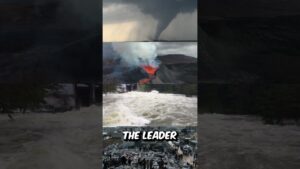
Artificial intelligence is transforming our lives every day. Internet of Things devices now control building temperatures, humidity and lighting, and even know what each of us is doing. It’s all designed to optimise energy efficiency and minimise the carbon footprint. So, should we let Artificial Intelligence take over the job of fixing the climate?
Help support this channels independence at
http://www.patreon.com/justhaveathink
Or with a donation via Paypal by clicking here
https://www.paypal.com/cgi-bin/webscr?cmd=_s-xclick&hosted_button_id=GWR73EHXGJMAE&source=url
You can also help keep my brain ticking over during the long hours of research and editing via the nice folks at BuyMeACoffee.com
https://www.buymeacoffee.com/justhaveathink
Video Transcripts available at our website
http://www.justhaveathink.com
Research Links
IEA – Energy Efficiency 2023
https://iea.blob.core.windows.net/assets/dfd9134f-12eb-4045-9789-9d6ab8d9fbf4/EnergyEfficiency2023.pdf
IEA : How energy efficiency will power Net Zero climate goals
https://www.iea.org/commentaries/how-energy-efficiency-will-power-net-zero-climate-goals
World Resources Institute
https://www.wri.org/research/seeing-believing-creating-new-climate-economy-united-states
United Nations – Cities of the Future
https://unhabitat.org/wcr/
Danfoss : Energy efficiency is the key to kick-starting climate success
https://www.reuters.com/plus/energy-efficiency-is-the-key-to-kick-starting-climate-success
Danfoss – The neglected demand side of the green equation
https://cdn.sanity.io/files/5zabm86v/production/1f18f79a7fcb97a3b5227ab17a21d2d8d2d7ed73.pdf
LumenCache website
https://www.lumencache.com/
75F Website
https://www.75f.io/
Brainbox AI website
https://brainboxai.com/en/
Passive Logic website
https://passivelogic.com/
Clockwork analytics website
https://clockworksanalytics.com/software/
Gridium website
https://gridium.com/solutions/energy-management-as-a-service/
Audette website
https://www.audette.io/
World Economic Forum : Zero carbon buildings
https://www.weforum.org/agenda/2020/01/zero-carbon-buildings-climate/
Check out other YouTube Climate Communicators
zentouro:
https://www.youtube.com/user/zentouro
Climate Adam:
https://www.youtube.com/user/ClimateAdam
Kurtis Baute:
https://www.youtube.com/user/ScopeofScience
Levi Hildebrand:
https://www.youtube.com/user/The100LH
Simon Clark:
https://www.youtube.com/user/SimonOxfPhys
Sarah Karvner:
https://www.youtube.com/channel/UCRwMkTu8sCwOOD6_7QYrZnw
ClimateTown: https://www.youtube.com/channel/UCuVLG9pThvBABcYCm7pkNkA
Jack Harries:
https://www.youtube.com/user/JacksGap
Beckisphere: https://www.youtube.com/channel/UCT39HQq5eDKonaUV8ujiBCQ
Our Changing Climate :
https://www.youtube.com/channel/UCNXvxXpDJXp-mZu3pFMzYHQ
source







So many possibilities, so little are done.
Live load and Dead load, doing engineering we learnt about this. A car 1200kg carries one person 80kg. 85% of the fuel you burn just moves the dead metal around.
An average electric bicycle weighs 25kg only 30% of your charge is wasted on the metal. Bikes are in the weather and can't do traffic speeds or trips so, what can we do?
I think the drive should be for two person cars that can travel highway speeds and can park in half a standard parking spot.
85% of our trips are alone, groceries can be put in the passenger space, on family trips both cars go with a child in each (for the majority of modern families). Stop carrying the metal around.
AI 'intelligence'(sic) is based entirely on scraping data of pre-selected LLMs of social commentators, international political hucksters and climate grifters, AI will necessarily 100% Agree with Al Gore's Carbon Cap & Trade Scheme (legal name) and Harri-Walz Climate Equity Reparations Wide Open Boarders Regime. 🐼🙋🇨🇳
Like an AI 'Make me a peanut butter and jelly sandwich.' It's gonna be peanut butter and jelly! 😂🎉
5.38 minutes ´occupied´
I might argue improving the efficiency of what we have now should be the highest priority just below getting more renewables in place. We won't need so much renewables if everything was as efficient as it can be.
Efficiency is well underrated!
tickets bought Dave!! hope to see you there.
You got me on this one, I really thought that common sense had come of vogue. The greenest electron is the one that is not used! One little comment, then off to buying more high tech stuff that will help us keep on consuming and still eat our cake too. WHY not actually living within our means? I don't need a smart house to turn off lights that I don't turn on, for example.
There was a saying back in the day… Live simply so that others may simply live.
Uhm… yea this doesn‘t convince me at all
You missed the downside on how much AI uses in regards to energy…
That LumenCache system is truly amazing, a thorough rethink of the entire electrical system. I hope it survives in the market, because it has huge potential. I myself have been through the process of rewiring to separate lighting and outlet circuits while staying within the limitations of my existing panel during a remodel. Now, lighting doesn't require 120v, and neither do a lot of other things in our homes. Some, like doorbells and thermostats, never have. Connecting all those things with ethernet cables to power, control, and piggyback sensors onto light fixtures, wall switches, and USB ports is brilliant. Add in the lack of sufficient wattage to burn the place down, the flexibility, the lack of need for code inspection, and the availability of a battery backup…I'm impressed.
A number of issues on this topic as shown in the video. A big one is not mentioning the climate impact AI is having through its energy consumption. I may have missed it, but AI across the spectrum is very energy consuming. The server farms that AI runs on are usually equated to cities and small countries in their energy consumption and it is only getting worse as the technology advances.
Placing an enormous demand on the electrical grid while trying to transition more of our fossil fuel technology to electric is country intuitive. It drives up demand, and thus cost. Further, a lot of the electrical grid is still fossil fuel based, so it is also driving directly to climate change as well.
Also, AI isn't the most necessary element to making the grid smarter for load balancing with appliances. Non AI algorithms can be deployed effectively as well. The most important element is building the ability for appliances to communicate with the grid. No amount of AI is going to help in that situation if the appliances can't communicate or be controlled. Of course, this also looks past the massive security and privacy issues with that subject as well. Something those pushing AI in this field are probably completely overlooking. What if hackers get appliances to suddenly drive demand up in peak periods or get them to fluctuate in unison as a means of damaging the grid?
Also, any benefits of off peak grid usage are only short term. This is only because electrification of fossil fuel elements in our society are still so early in their adoption that demand is low. This will all go away once more and more electrification is done. An electic car holds about 2-3 days of average household electric supply. That is if you could get your house to run off your car, it should be able to run everything for more than 2 days on its charge.
When a small percentage of people have electric cars, this just seems like an increase in households to the electric grid. Eventually though, as the percentage of the population adopting the technology grows, it will be like doubling or tripling the households on the grid. It's not really a one to one situation though, but what will happen first is there will no longer be off peak hours. Eventually so many batteries will be charging in off hours that they will cease to be off hours.
This will have knock on effects, as the grid was designed to take advantage of off peak hours. These are the times when facilities are taken offline for higher levels of maintenance required to keep them running. Has that been forecasted for?
The reality is that society is going to need to change quite a bit. Efficiencies aren't going to make a big enough impact on the tens of billions of tonnes of carbon we spew into the atmosphere every year.
Our transportation model, even when electrified, simply consumes too much energy. The idea of transporting tonnes of metal, plastic, and glass just to get one or two people from A to B is an idea long overdue for being erased from our society.
Again, one charge for an electric car is typically more that 2 days of an entire household's electrical usage. This doesn't account for the fact that a large portion of a cars total carbon footprint is made when it is manufactured, not over its lifetime of usage. So electric cars still have nearly as significant of a total impact as any other car.
This also doesn't account for how much oil an electric car consumes. How much plastic goes into one? Tires, which electric cars use more of as they are heavier?
Also, what about infrastructure. Paving one mile of road releases something like 4000 tonnes of greenhouse gases. Electric cars will require just as much infrastructure and actually cause more wear and tear that gas cars.
Electric cars may seem like an improvement, but they are step back really. To force the transition quickly enough to have the impact we are hoping they will have, we will actually be causing more damage. It will cause a massive wave of building, not just cars, but infrastructure, to meet the goals necessary, that it will increase emissions.
Building out and transitioning to a robust public transportation model would be far more energy conserving than electric cars will ever be.
DO NOT integrate your home into any smart grid. It's an invasion of privacy.
In my lifetime, I’ve seen the planet get turned into a plastic pollution nightmare. Did anyone see the the grand tour episode through North Africa? They built floats with the waste plastics and ride coal trains as far as the eye can see. The poor countries are drowning in garbage and clearly don’t know what to do
Is anyone finding that entering the code leads to higher prices?
Yeah, let's IOT everything so my toaster can conspire with my fridge on how to off me… on a more serious note, maybe stop making us so hackable. We don't want Cylons, do we?
The video title and intorduction briefly made worried this was going to be a "technological progress is bad" video and I am so glad it isn't. I should have trusted that the video would be balanced, fair and positive about solutions as often as concerned over problems. They always hit that mark, this channel is a great body of work in that regard and a real achievement. Thank you.
I'm not seeing the "INSANE effect" just yet, unless you're speaking to negative effects. We've known about the capabilities of smart grid tech, energy storage, on-demand heating/cooling and machine learning long before AI was a thing. Now what I am seeing is AI data centers eating up terawatts of energy apparently solving all the worlds problems. Unfortunately those problems seem to be erasing tourists in the background of Instagram photos and making women's lips look botoxed. In fact, I am wondering at what point AI is going to turn the tide here and if it ever will? Perhaps the best we can hope for is if the energy efficiencies it allows will neutralize the obscene amount of energy used to generate CatJesus photos, plagiarized school reports and deepfake Taylor Swift "adult" videos. In addition, what about when AI goes wrong? For example I purchased a "smart" irrigation controller for my lawn and shrubbery. It is supposed to read the local weather reports to determine how much water your grass needs based on soil type, etc. Well my grass ended up dying because it decided I only needed 1 min per day of water. Then it took tons of time reseeding, watering, fertilizing and extra chemicals to keep the weeds from taking over and months to get it back to normal. I just haven't seen the net benefits yet of any of this AI tech and I'm not sure we ever will, before one of the Boobflation AI's goes rogue and tricks NORAD into believing Moscow has launched a nuclear attack on NATO causing the US to launch an ICBM at Moscow triggering a real war, OR creates enough media manipulation and deepfake content to facilitate Kim Jong Un winning the US election.
4:20 “renewables have followed an exponential function so far; but we predict they will start increasing linearly next year” ~ experts.
I think that AI consumes a lot of energy too, also including not renovable, so I think that it's not so simple
AI is not contributing to climate change. our continued use of fossil fuels is. all this processing (like crypto) is increasing the adoption and expansion of renewables.
Totally off topic, but have to say that I love the colour of your jumper/sweater/top ❤❤❤
Thank you so much for all of your research-based videos!! I'm deeply grateful for the work that you do. In an era starkly contrasted by our dire need to act decisively, the denial of our climate emergency and cynicism that anything will be done, you provide hope rooted in careful research. In shining a light on the work of those to choose to act, you encourage your 580+ thousand subscribers, plus many others to not give in to cynicism, learn more and also act. Please keep up your excellent work! You inspire a generation!
Great video, thank you. But, I'm confused by one of the stats you mentioned: at 4:50 you say buildings contribute nearly 40% of GHG emissions. However, the chart you show at 11:20 of GHG emissions by sector show buildings as only 17.5% – what explains this disparity? 40% of 'energy-related' GHG emissions maybe, but 40% of 'total' GHG emissions, I don't think so?
Brilliant ❤
The most efficient heating and cooling is CLOTHING. Clothing should be made with a controller that monitors the body and heats and cools it accordingly to create optimal comfort regardless of external temperature or level of metabolic activity. If such clothing were available and used, the amount of heating and cooling required of buildings would be SIGNIFICANTLY reduced. Most people live in older buildings and will do so until the housing stock can be replaced — and we don’t have time for that. With the use of clothing, no expensive retrofits are required and we can reduce energy use and associated global warming CO2 emission footprints of buildings IMMEDIATELY!
I have a Raspberry pi program that I wrote on my computer that senses ambient temperature around my house and alerts me when it is time to open or close my screen doors and windows. Using this simple system, my heating and cooling costs are now 1/3 of what they previously were. ✅🤑✅
NONE!
Misleading title. This video felt like a long commercial for Samsung and Siemens.
I'd like to see a plan to use enclosed sea water pods in the heat of the sun evaporate into collected fresh water and pumping it into Death Valley. It's proven science being done overseas, changing sea water into distilled water. After all the forest fires, where is the campaign for trees? GHWBush wanted 20 billion trees planted more than 30 years ago.
AI has absolutely nothing to do with it.
DR. K.F. SOCCER S-P-C KNOWS
THAT WE ARE EXPERIENCING IS
THE EARTH'S NATURAL DISASTERS HAPPEN EVERY 50 YEARS
FOR 25 YEARS 1985-2011 THE EARTH RETAINS 25-3O KILOTONS OF SURFACE WATER TO THE CORE OF THE EARTH AND THAT IS WHAT HEATS UP THE PLANET AND THEN IT STARTS TO EXPAND-CRACK OPEN AND WHEN THAT HAPPENS THE ENTIRE ATMOSPHERE AROUND THE ENTIRE WORLD HEATS UP AND EXPANDS TOO
AND IT CAUSES HELL ON EARTH
MAJOR TECTONIC PLATES CRACKING
MAJOR VOLCANIC-EARTHQUAKES
MAJOR VOLCANIC-SMOG ERUPTIONS DAILY EVERY 50 YEARS
MAJOR INFECTIOUS DISEASES PANDEMIC
MAJOR EXTREME WEATHER EVENTS
THAT IS FROM
2012 TO 2024
2024 TO 2035
MAJOR COLD FREEZING HEAVY SNOW STORMS WINTERS IN A ROW TO CLOSE UP THE TECTONIC PLATES AND THEN IT WILL START ALL OVER AGAIN
2035 TO 2060
Lumencache's technology is very nice. It is a much better way to do lighting than what we currently do. Currently they only sell US-style switches so you can't sensibly fit it in the UK. Also it's a proprietary tech, which is never a good thing (although I see they claim it is an 'open platform' on their site now, so perhaps that has changed?).
climatism is such a load of hokey
While I am hopeful that AI will offer ways for us to walk back from the cliff we are approaching with climate change I also know that large corporations are investing in nuclear power plants just to meet the energy demands of AI. When compared to traditional search engines, AI uses “orders of magnitude more energy,” says Sasha Luccioni of the AI research company Hugging Face, who studies how these technologies impact the environment.
Love your work, but I have to point out that the "service energy" is not exactly the energy that we are going to need. The discussion is a bit more complex because the eletric alternatives are not 100% efficient, expecially for industrial processes and in the mean time, some low temperature heat will be provided by heat pumps that just need somewere between 1/3 and 1/6 of the service energy. I'm planning to do a video of my own about that focused on my own country's energy system. In our case (Italy) we would need about 1.44 times the service energy to sleep well. That means an increase of 44% on the figure suggested here. However, it still means that in the US (if the same conditions were to apply) you would need 47,5% (=33%*1,44) of currently used primary energy.
Jevons' paradox has been well understood for over one hundred years yet we ignore it to naively believe that increased energy efficiency will somehow magically solve the climate predicament. Increased efficiency enables and encourages more consumption of a given resource, not less. To believe otherwise is to fundamentally misunderstand the nature of the challenges we are confronted with.
Best not to have to travel miles everday to cram into an enomous building with others? Just send an e mail or two instead? Carrier pigeons for all. No AI data sheds needed for every eventuality, shurely.?
As always, thanks so much for your realistic yet positive stories, Dave!!
Dave, Dave, cut me Dave and just like a stick of rock I’ve everything totally Electric from Rebuildables,, sorry, Renewables (alternative, clean energy) printed throughout me. It’s very easy Dave to produce wonderful techno promos (especially with AI-LLM’s) and have those techno nerd’s paint a rosey picture of what their view of utopia look likes, but in they real world it’s nowhere near as simple (especially scale and complexity). Let’s start with the physicals, not one single, yes not one single piece of this Renewable technological utopia WOULD EXIST without FREE FINITE Flammable Fossils of Oil, Gas and Coal. And then there’s the other side of this renewables energy story:-
Prof. Tom Murphy: It turns out that solutions are really easy when your boundaries are narrow and your visibility of the problem is narrow, then it's you know, it's a snap as you gain awareness and perspective you realize that, oh well there are complications, it's not so easy, what is it we do with our energy, and so that list of things that I went through [explained in full video] about what's causing this biodiversity crash almost none of those have to do with fossil fuels, a suitable substitute would basically just do the same thing, it's swapping the engine but you continue the mining and the manufacturing and the pollution and the deforestation and the habitat loss, and I haven't heard anybody talk about okay once we have solar we can stop doing all of these things, because the point is once we have solar we can keep doing all these things, isn't that great, it's keeping modernity fully powered, that is the goal.
Extract from Nate Hagens – The Great Simplification – Video Shorts – YouTube
Transcript from 1 minute video “Tales from the Carbon Pulse | Reality Roundtable 11”
Prof. Tom Murphy is a Professor of Physics at the University of California San Diego🤔
We really are scratching for solutions Dave, this word recycle is a misnomer, because at the end of the day it isn’t, and nor does it appear be bio degradable (as in any reasonable time period). But where is all this Rebuildable, sorry Renewable (alternative, clean) Energy taking us, well to exactly the same place that FREE FINITE Flammable Fossils were/are taking us to, but I’ll let Prof Tom Murphy explain:-
Prof. Tom Murphy: It turns out that solutions are really easy when your boundaries are narrow and your visibility of the problem is narrow, then it's you know, it's a snap as you gain awareness and perspective you realize that, oh well there are complications, it's not so easy, what is it we do with our energy, and so that list of things that I went through [as explained in full video] about what's causing this biodiversity crash almost none of those have to do with fossil fuels, a suitable substitute would basically just do the same thing, it's swapping the engine but you continue the mining and the manufacturing and the pollution and the deforestation and the habitat loss, and I haven't heard anybody talk about okay once we have solar we can stop doing all of these things, because the point is once we have solar we can keep doing all these things, isn't that great, it's keeping modernity fully powered, that is the goal.
Extract from Nate Hagens – The Great Simplification – Video Shorts – YouTube
Transcript from 1 minute video “Tales from the Carbon Pulse | Reality Roundtable 11”
Prof. Tom Murphy is a Professor of Physics at the University of California San Diego🤔
When it comes to buildings, you state yourself that traditional suburban individual houses consume up to 50% for the heating, cooling, lighting, … (usage). Considering that this type of building is particularly inefficient, I think this highlights the fact that the main issue with buildings does not come from exploitation (usage) but from the construction of the building. Materials like concrete, steel and plastics (for insulation and water resistance) are the main emitters of GHG and the main energy consumers. As someone studying architecture and engineering, I feel uncomfortable when the debate around the impact of construction on the environment is polarized around the only question of the building’s usages, that is indeed the easiest of the problems in this field.
This without mentioning all the implications in terms of energy consumption for a widespread use of AI (not only in buildings, but in all economic fields of our society).
BUT the actual problem is that global air pressure has been dropping for decades [source: HadSLP2 dataset]. Unfortunatly a significant reduction in the equitorial cloud mass is also ensuring the vast amounts of additional solar heat is being absorbed and distrubuted by the ocean currents from the areas which are subjected to the cloud loss. Reputations and multi billion dollar expens accounts have been bet on the taxpayers being conned into coughing up on a premise that a 0.02% alteration in the atmosphere is responsible for the addititional heating of the remaining 99.98% is being transfered to the oceans, $9% of which to the Atlantic. So which is it – humans reducing the equitorial cloud mass or the 0.02%?
All of these clever applications of AI may just, if we're lucky, balance out the incredibly high energy consumption associated with AI. (A tension I'm surprised you didn't allude to yourself, Dave). And then there's Jevon's paradox, which will surely cancel out any efficiency savings (again, something you might have mentioned, Dave).
Not your best effort. A bit hopium-infused and techno-optimist. But thanks anyway.
HAPPY CRAPPY
LOOK UP ALL INTELIGENCE DECIPLES. SATALITE MONITORING COMPANY. BASICALLY AI DECIPLES. SOUNDS SAT?NIC TO ME !!!